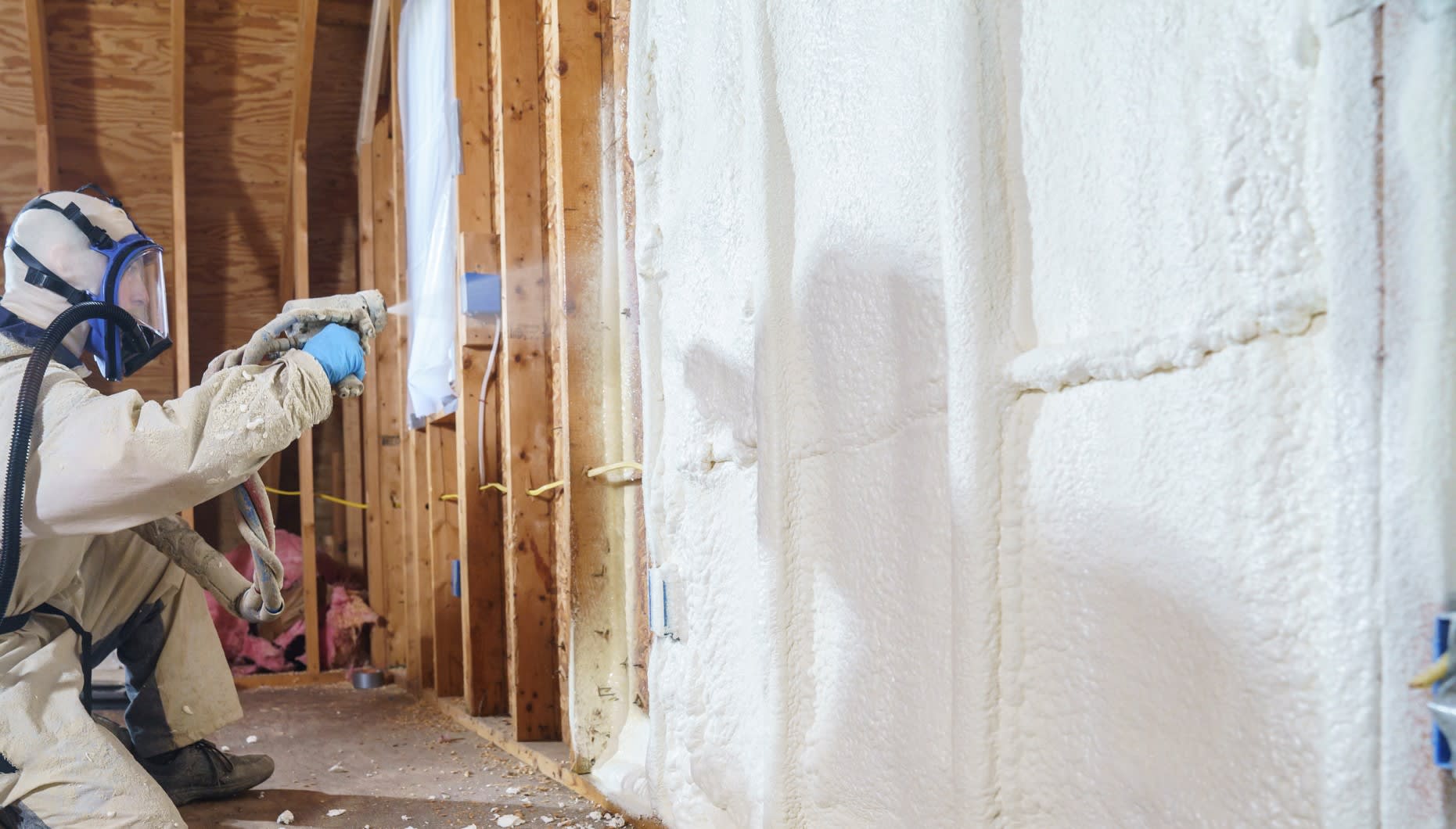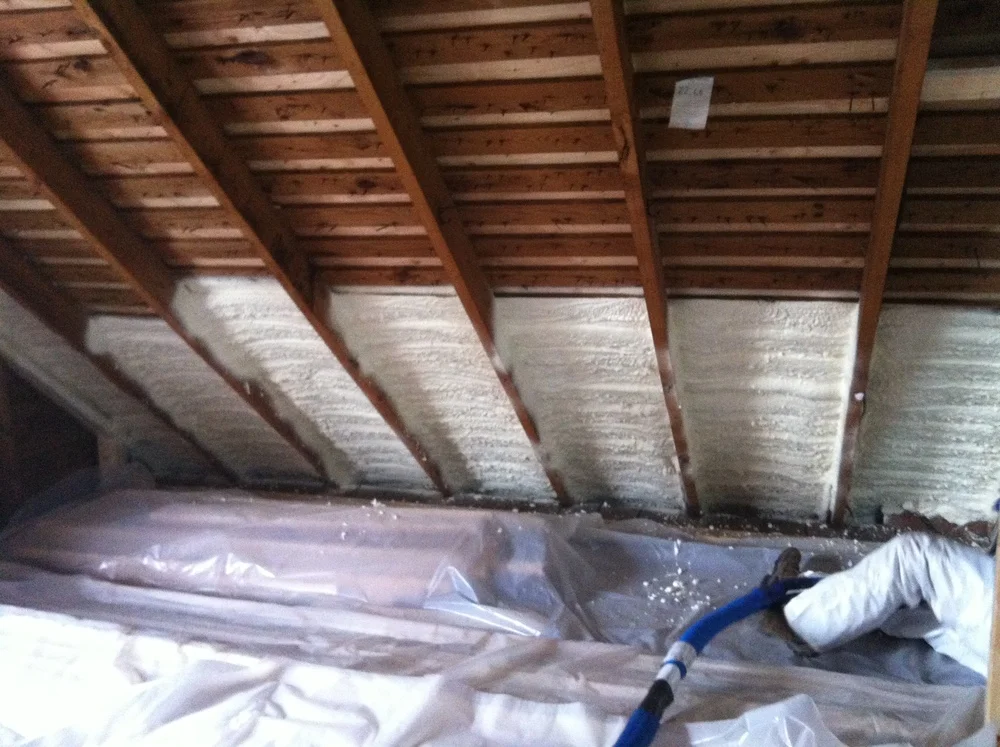How Spray Foam Can Enhance Energy Efficiency in Your Home
Spray Foam: The Ultimate Option for Air Sealing and Insulation
Spray foam insulation has become a leading remedy for effective air sealing and thermal insulation, using an one-of-a-kind combination of residential or commercial properties that set it besides traditional methods. Its capability to increase and load spaces makes it particularly efficient in preventing air leakage, which can considerably affect power performance. However, recognizing the full scope of its advantages, installation procedures, and contrasts with other insulation kinds is critical for making educated choices. As we discover these facets, the ramifications for both brand-new constructions and retrofits come to be significantly substantial. What aspects should affect your option?
What Is Spray Foam?
Spray foam is a flexible insulation product that combines the principles of air securing and thermal resistance to boost power effectiveness in structures. Made up primarily of polyurethane or various other similar compounds, spray foam is used as a liquid that expands upon call with surface areas, developing a strong, constant layer of insulation. This unique residential or commercial property allows it to fill spaces, splits, and spaces that typical insulation products might overlook, providing an exceptional air seal.
There are 2 major kinds of spray foam: open-cell and closed-cell. Open-cell spray foam is lighter and much more flexible, using superb noise absorption and a reduced R-value per inch - Spray Foam. In contrast, closed-cell spray foam is denser, providing a greater R-value, moisture resistance, and included structural stability to constructing components
The application procedure commonly entails specialized devices, making certain a smooth application that sticks to different substrates, consisting of timber, metal, and concrete. This adaptability makes spray foam ideal for both brand-new constructions and retrofitting existing structures. Its capacity to produce an airtight obstacle significantly adds to decreasing energy intake and improving indoor air quality, therefore making it a preferred selection among home builders and property owners alike.
Benefits of Spray Foam Insulation
Among one of the most significant benefits of spray foam insulation is its remarkable ability to develop a continual air barrier, which properly reduces power loss. Unlike typical insulation products, spray foam expands to fill up fractures and spaces, making sure that air leakage is substantially reduced. This particular not only improves power performance but likewise leads to reduce energy costs over time.
In addition, spray foam insulation supplies premium thermal resistance, adding to an extra steady interior atmosphere. Its high R-value per inch enables efficient insulation in constrained spaces, making it suitable for attics, walls, and crawl areas. Moreover, the moisture-resistant properties of spray foam aid avoid mold and mildew and mildew growth, promoting much healthier living problems.
Another critical advantage of spray foam insulation is its sound-dampening top qualities (Spray Foam). It effectively reduces noise transmission in between areas, developing a quieter and much more comfy home atmosphere. The durability of spray foam likewise stands apart, as it does not sag or resolve in time, maintaining its performance throughout its life-span
How Spray Foam Functions
Recognizing exactly how spray foam insulation works is vital for valuing its effectiveness in air securing and thermal resistance. Spray foam insulation includes two primary components: isocyanate and polyol material. When these parts are mixed, they go through a chain reaction that creates the product to broaden quickly, creating a dense foam that fills up splits, gaps, and tooth cavities.
As the foam expands, it complies with surfaces, forming an impermeable seal that significantly minimizes air infiltration. This characteristic makes spray foam insulation extremely effective at stopping drafts and moisture infiltration, which can cause power loss and damages with time. Additionally, the closed-cell version of spray foam supplies remarkable thermal resistance because of its rigid framework, successfully minimizing warmth transfer.
The distinct homes of spray foam permit it to adapt to uneven surfaces, making sure extensive protection and a smooth barrier. As a result, spray foam insulation not just enhances power performance however additionally adds to improved indoor air top quality by decreasing the accumulation of toxins and irritants. Ultimately, comprehending the mechanics behind spray foam emphasizes its role as an exceptional option for insulation and air securing in both business and domestic applications.
Installment Refine Summary

Before installment, the space has to be appropriately cleansed and prepped, ensuring that surface areas are without debris, dampness, and dirt. This action is important due to the fact that contaminants can endanger adhesion and total efficiency. Once the location is prepared, the application involves blending both components of the spray foam, which expands upon get in touch with and loads spaces effectively.
Trained professionals should conduct the setup, making use of customized devices to guarantee uniform coverage and optimal density. Security safety measures, consisting of putting on safety equipment and guaranteeing correct air flow, are vital throughout this process. After application, the foam commonly cures promptly, forming a strong barrier that improves energy effectiveness.
Contrasting Spray Foam to Typical Insulation
When assessing insulation alternatives, spray foam insulation stands out in comparison to traditional products such as fiberglass and cellulose. Unlike fiberglass and cellulose, which can permit air seepage, spray foam increases upon application, loading holes and spaces to produce a closed seal.
Furthermore, spray foam provides a higher R-value per inch than conventional insulation kinds, supplying even try this out more reliable thermal resistance in a thinner profile. This characteristic is particularly advantageous in spaces with limited dental caries deepness. Spray foam is immune to wetness and mold growth, which can be a considerable issue with cellulose and fiberglass, particularly in damp atmospheres.
Nevertheless, spray foam insulation commonly carries a greater upfront cost than its traditional equivalents. Homeowners have to weigh this preliminary financial investment versus long-term energy savings and performance advantages. Ultimately, while both insulation types offer their purpose, spray foam becomes a more advanced option for modern-day insulation demands, especially in terms of air sealing and thermal efficiency.

Final Thought
In summary, spray foam insulation represents a highly reliable remedy for attaining ideal air sealing and thermal resistance. Its one-of-a-kind homes, including dampness resistance and noise dampening, make it appropriate for various applications in both new buildings and retrofitting tasks (Spray Foam). The initial expenses might be greater compared to typical insulation materials, the lasting benefits, such as significant power cost savings and boosted interior air top quality, justify the financial investment and emphasize its value in contemporary structure methods.
Spray foam insulation has emerged as a leading service for efficient air sealing and thermal see here now insulation, offering an unique mix of properties that set it apart from typical methods.Spray foam is a flexible insulation product that incorporates the concepts of air securing and thermal resistance to improve energy efficiency in buildings.When examining insulation options, spray foam insulation stands out in comparison to typical products such as fiberglass and cellulose. Ultimately, while both insulation types serve their objective, spray foam emerges as a much more innovative remedy for modern-day insulation demands, especially in terms of air sealing and thermal performance.
In summary, spray foam insulation stands for an extremely efficient solution for accomplishing optimal air securing and thermal resistance.